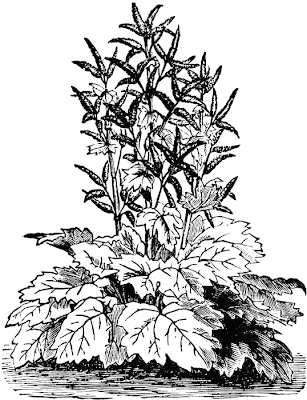
In Easy to Remember (2000), William Zinsser counts rhubarb among his list of “magical words” with powerful connotations. (Rhubarb is a red-stemmed medicinal plant.)
Rhubarb is the name of a magician’s rabbit in Prophet Annie by Ellen Recknor (2000).
Create pure wonder and awe whenever you speak.
A one-of-a-kind resource for magicians and word lovers, exploring the most intriguing magic words and phrases from around the world.
Meanings:
“‘A friend?’ Ashtaroth swung back his left hand and shot it forward in a wicked pitch that sent a stream of fiery energy crashing into the statue. ‘Aemaer! Friend you are and friend you shall be, emblazoned now for all to see!’ As the arcane smoke cleared, Loew edged in to examine the demon’s handiwork. The golem leaned back against its dolly, as impassive as before, but there was a change. Carved into its wide flat forehead were the letters f-r-i-e-n-d.” —Deborah Van Fossen, “Gone with the Golem” (2006)
“I don’t know why, but I took an eyeliner pencil, and I wrote the word ‘Aemaer’ on his forehead. I meant it only as a last gesture—my own goodbye. I knew the word from my Pop Pop’s books, a magic word meant to give life, to grant protection. I in no way imagined that it would act as anything more than a symbol—a mark of forgiveness that would fade away all too quickly as I stuffed John’s body into the crematorium oven.” —Christopher Michael Davis, “Cosmetics,” Little Knives: Twelve Tales of Horror and the Supernatural (2004)
Origins: Kabbalic lore. Aemaer is likely a variation of Aemaet.
Meanings:
Origins: Devotion is from the Latin devotio, meaning “zeal.”
In Literature:
Devotion—a sound, a wondrous word,
Fragrant with love and holy silence;
A magic word, whose beauty is enough
To convince us of the power of Truth.
Just pronounce the magic word ‘Art’, and everything is O.K.
—George Orwell, “Benefit of Clergy: Some Notes on Salvador Dali,” Fifty Orwell Essays (1944)
In Literature:
Club in a sack recalls the fertility rites associated with early magic, the club symbolizing the male reproductive organ, the sack symbolizing the womb, and the two joined in sacred union.
In Literature:
Meanings:
“‘Why not?’ he asked. ‘Why not, by Jingo?’” —T.H. White, The Once and Future King (1939)
Variations and Incantations:
“[H]e whistled the ballad ‘Oh, by gee, by gosh, by jingo’ as though it were a hymn melancholy and noble.” —Sinclair Lewis, Babbitt (1921)
—e.e. cummings, “next to of course god america i” (1926)
—Sir Arthur Conan Doyle, The Return of Sherlock Holmes (1903)
—Michael Connelly, The Closers (2005)
In Literature:

Zara, enchanted by your powerful magic.
—John Lord Campbell, The Lives of the Lord Chancellors and Keepers of the Great Seal of England Vol. 4 (1851)
Mystique: Zara recalls Zarathustra (also known as Zoroaster), the ancient Persian prophet.
Meanings: The root of Zara is zar, meaning “gold.”
Origins: Zara is of Persian origin.
In Literature: